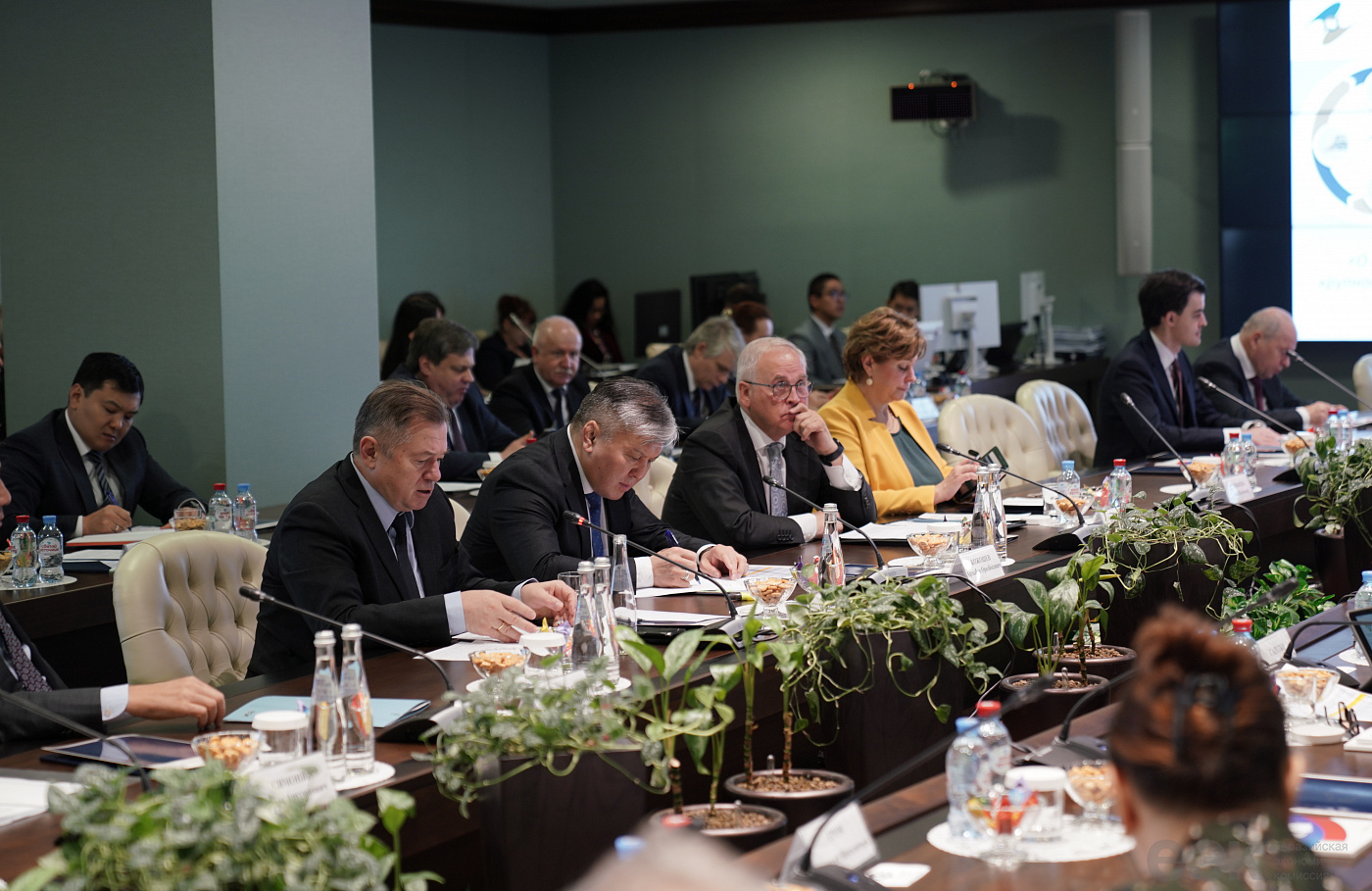News
Arzybek Kozhoshev: "The paramount task is to make efficient use of infrastructure possibilities and to create new mechanisms to promote promising freight traffic"
The large-scale restructuring of transport links and the role of seamless boundary crossing in light of restrictions caused by the sanctions pressure were discussed by attendees of the round table "State and Prospects of Transboundary Movements" organized by the EEC jointly with the International Coordinating Council on Trans-Eurasian Transportation. The event chaired by Arzybek Kozhoshev, EEC Minister in charge of Energy and Infrastructure, was held on November 10 at the EEC’s headquarters.
"The addresses made confirm the significance of a systematic approach when forming an efficient and stable system for organizing deliveries considering the economic realities", Arzybek Kozhoshev noted. He reminded that in order to further integrate the EAEU States’ national transport systems into the global transport system and increase trade volumes, the Commission, jointly with the countries, continued work to develop transport infrastructure of the Eurasian transport corridors and routes, including the international transport corridors "East - West" and "North - South". In August this year, the Heads of Governments of the "five" countries approved a list of seven priority infrastructural transport projects in the EAEU countries.
Bakytzhan Sagintaev, EEC Minister in charge of Economy and Financial Policy, highlighted the need to improve the efficiency of interaction between the EEC and the business community in developing transboundary corridors.
According to Sergei Glazyev, EEC Minister in charge of Integration and Macroeconomics, we need up-to-date forms to finance transport projects, for example, through concessions and organized consortia. Besides, according to him, it would be relevant to draw up an option to register such consortia in the "Eurasian jurisdiction", rather than in a country one.
Varos Simonyan, EEC Minister in charge of Internal Markets, Information Support, Information and Communication Technologies, provided information on promoting digitalization of transport corridors which should contribute to creating an efficient system enabling to promote and provide digital logistics services according to uniform rules.
Gennady Bessonov, Secretary General of the International Coordinating Council on Transportation, believes that mutual complementation of infrastructure, transportation, logistics and information technology projects and initiatives is the key to further development of transport corridors.
All this taken together should contribute to debottlenecking, overcoming the EAEU barriers and restrictions and access to foreign markets, Arzybek Kozhoshev noted.
According to Vladimir Ivin, Deputy Head of the Federal Customs Service of Russia, common electronic technologies for transiting goods should be immediately implemented when creating new logistics routes. He noted an increasing interest in organizing end-to-end transit technologies in the Greater Eurasia space. For ten months of this year, only Russian customs officers issued more than 904 ths electronic transit declarations, 35.7% of which were issued for rail transportation. Along with that, transiting to the common standard for filling in an electronic bill of lading and establishing uniform requirements to its format and logistics control can become the blueprint for the seamless transit.
Alevtina Kirillova, Director General of Autonomous Non-Profit Organization "Eurasian Agrologistics" noted upward trends in implementing the project. Despite the pandemic-related restrictions on the Chinese side with respect to product supply, the annual transportation volume within the Eurasian Agroexpress project forecast by the beginning of 2023 is expected to reach the level of 500,000 tons, according to the management's estimates.
Anton Kozlov, Head of Foreign Projects and International Cooperation Department, JSC Russian Railways, noted that Russia's exports declined this year due to sanctions although the day-to-day realities were much better than some forecasts. Along with that, freight traffic with China increase (+25%), and India took the lead in growth rates (+96%).
Kirill Tyulenev, Deputy Director of the Research and Analysis Centre for Integrated Transport Solutions (RACITS) of the Ministry of Transport of Russia, underscored the importance of creating new intercontinental line shipping services integrated with onshore sections of the Eurasian transport corridors for regular access to global transshipment ports. As part of the scenario modeling by 2025, an increase in cargo traffic in the Azov-Black Sea basin is estimated at +40%, it will increase by +150% in the North-South ITC and by +30% on the Eastern Polygon routes.
"Given the variable demand for transport company services, our paramount task is to make efficient use of infrastructure possibilities and to create new additional mechanisms to promote and attract promising freight traffic", Arzybek Kozhoshev believes.
The round table was held involving representatives of the EEC, the EAEU States’ ministries and departments, railway administrations, transport and logistics companies, associations and corporations, development institutions and the academia. The discussion took place in the "EAEU Plus" format: besides representatives of the Republic of Armenia, the Republic of Belarus, the Republic of Kazakhstan, the Kyrgyz Republic, and the Russian Federation, the discussion was attended by representatives of Uzbekistan, and heads of the PRC transport and logistics companies.
A joint statement, reflecting approaches, initiatives and proposals given in the addresses and during the discussion, was prepared following the event.






